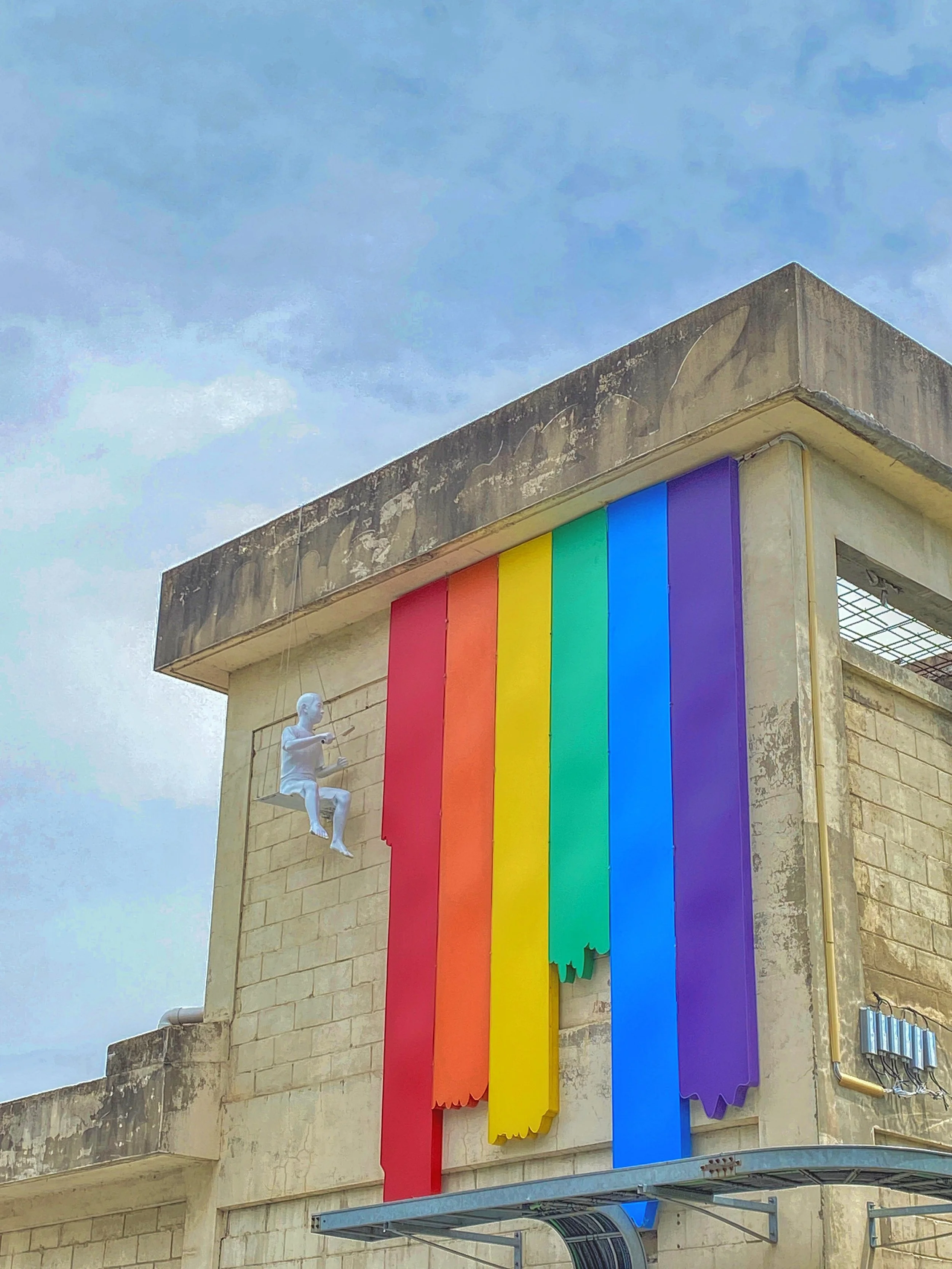I am wearily walking toward the TSA pre-check line, weary from adrenaline depletion and ready to head home. I am an introvert, but I play an extrovert at conferences.
The airport staff member is checking our mobile boarding passes for the little green check mark.
Like an auctioneer, he’s rapping: Are you PreCheck? You are PreCheck? Yes? That way. Are you PreCheck? No? You’re normal? This way please.
I laugh, and eagerly show him mine, always proud to be anything but normal.
This jolts me out of my exhausted post-conference trance. This is the first time I see, in front of me stands a giant tree trunk of a man, showing his US passport to security, even though we are in a domestic terminal.
I am immediately mesmerized. Scanning up, first it’s the size of his muscular calves. Very strong legs. A tattoo above the back of his knee, of a red bowl with chopsticks. It’s small, maybe an inch, squared.
It strikes me, because his skin is white, he is white and I can tell that he wasn’t raised in Asia. He carries himself in a Western way.
I don’t know if it’s from China or Korea or Japan, but I know it’s a mark of a traveler.
Down his other calf I see a detailed tattoo of a Mexican Calavera (skull). A travel mark from the other end of the earth. I know both sides of the planet, too. And while my calves no longer have any defining muscle and I do not have a single tattoo, this man is feeling more like a colleague than a stranger to me.
Just two travelers in the PreCheck line. It’s been a decade since I hung up my 50L Osprey backpack. It’s actually on a shelf in my basement, the zipper is hard to open, still caked with the grime and dust of whatever happens under a long haul bus. The last time I wore it deboarding a bus from Lake Titicaca to the grand city of Cusco, Peru. I then left the pack at a local hostel, for a fee, so I could just bring my day pack on the five-day Salkantay trek to Machu Picchu.
This adventure was the last stop of my fifteen years living abroad, though it wasn’t supposed to be.
I was supposed to stop in Arequipa before heading off to go sandboarding down the dunes of Huacachina, Peru. You can’t do that with a broken ankle, though, can you.
The day after the trek finished, I broke my ankle on a funky step in my hostel and two days later I broke up with my girlfriend of 8 years. A few days later, an airport staff member is wheeling me through the airport in Cusco, and I’m headed back to live my native country, an act I had been avoiding since I graduated college.
Just two travelers, he and I, waiting to go through security. His proximity to me, his confidence, our being in the airport together for just one moment - it brings a part of my nomadness back to life.
He’s definitely still in the thick of it. He’s living and working on the road now.
I know this, because at that moment, it hits me: he is wearing a t-shirt and shorts. This is Boston in October. Where’s his coat? See, he’s coming from somewhere warm, and off to somewhere warm. He’s tall and very strong. He’s wearing a t-shirt and short, fitted shorts. He’s changing planes here.
That’s why he’s using his passport as identification. He never uses his US license, but is always brandishing his passport at every hostel, hotel, land border, airport and immigration office. He’s a full time traveler, marking his most meaningful stops in beautiful body art.
As I continue to take him in without staring, I realize he is drenched with sweat. Beads of it run down his shaven sideburns and he keeps tugging his shirt and shorts, airing himself off. He’s not out of breath, but he rushed here. He’s acting calmly, but he’s got a flight to catch, and soon.
As we inch closer to the scanners, he’s not huffing and puffing about how long it’s taking, but he’s attentive, estimating the timing as to whether he’ll make his next flight.
I want to talk to him. I want to know his story. I want to say, where are you headed? Where are you coming from? I used to be you. I used to do this, too. I used to flit in and out of America like it was just any other country and not where I was born and raised.
But I don’t. I’m quiet. ‘Real’ travelers get sick of answering those questions. My youthfully arrogant idea after a few years in the road was to make a laminated card with the answers to the five most typical questions people would ask: Where are you from (Chicago), how long have you been on the road (in total, 4 years as a nomad, over ten before that as an expat), where are you coming from, what’s the next stop, what’s your favorite country (Mexico, Cambodia, Portugal)? And the bonus: you travel full time? Are you a trust fund baby? (Nope, just resourceful and a happy minimalist)
If someone had something more interesting to ask beyond those five questions, then we could have a conversation. At one point, a bunch of my nomad friends and I who had traveled together in Chiang Mai, and Berlin, and Buenos Aires started calling non-nomads, ‘muggles’.
Looking at him, I am embarrassed by, and miss, the arrogance of those days. Even though I want to talk to my fellow traveler, I don’t want to be the person I used to avoid. I don’t want to be a Muggle, after all.
Now I notice the size of his backpack. It’s a carry on, but large - a 32L pack that the lightest-packing nomads use. Mine was 50L so I had to check my bag on planes. He’s carry-on only. He has no smaller daypack, either. I could be wrong. He could have a checked suitcase, but the size of his pack leads me to believe that he’s got everything he needs inside, and can take off anywhere on a whim.
He turns toward me and as he bends to put his passport away for the scanner. I see the head of a Buddha tattooed on his thigh, peeking out from under his shorts. So his tattoos are Korean and Mexican and probably Thai, then I see the bull tattoo on his inner calf, a part so muscular my body doesn’t even have that body part. It’s the bull tattoo I’ve always wanted to get since I was rammed by a cow in India. I assumed it represents time in Spain.
His tattoos are still spaced out, more bare skin than ink, but all on one leg. In time, this will become a full leg of tats. I find my heart aching, tugging at my soul when I focus on how much traveling left he has to do, how much space he intends to still fill with the permanent symbolic markings of his travels.
For now, we are two travelers, waiting for the scanner in the PreCheck zone, surrounded by relatively novice travelers: one doesn’t realize he’s still got his earbuds in, but can’t hear security telling him to take them out; one can’t figure out whether or not she is supposed to take off her shoes.
But the two of us, we’re ready. Everything is put away, we are calmly waiting behind everyone else holding us up. Even though he is playing it cool, I can tell he’s a bit anxious, overly attentive to minute movements of others that can add up to him making or missing his flight.
As we inch closer to our separation, my desire to chat surges, but I know in one minute we’ll both be through and he’ll saunter swiftly away toward his gate, off to his next adventure. He can’t appreciate the strangling stronghold nostalgia will have on him later in life, the grip of deep yearning to revisit a place and time that can never truly be recreated.
As I come back to myself, my current self, I think about my small talk now: the kids are always sick, pizza days are the best because you don’t have to pack their lunches, and, my favorite rebellious theory: stroller and car seat companies are some kind of secret racket (have YOU ever seen a TV commercial for either one? They don’t even need to advertise….).
This small talk is a far cry from the laminated questions on my theoretical nomad card.
I feel the far cry between the two of us travelers.
And just like that, he’s through the scanner (nothing beeps of course) and I’m next (smooth sailing) and I know there’s no way I’ll get to peek at where his plane is off to. I’ve got a wheely suitcase to push now, after all.
Off he goes. His two steps are my ten and in his ten steps he is now just a memory.
Guys like him were a dime a dozen in my life. They were the one gringo face on a bus of locals in Bolivia, or the one stepping out of the shared hostel shower while I awkwardly waited my turn. They’re the ones on the lava boarding tour in Nicaragua, or living in the expat-favorite Smith building just outside the city wall in Chiang Mai. They’re the ones taking the boat from Panama to Colombia to avoid the wild Darien gap (most of us just fly). They’re the ones you meet hiking the W trek in Chile or day-trading stocks from a hostel in the mountains of Guatemala.
I never felt connected to these strong, adventurous men back then, because when you’re splitting hairs, they felt so different to my experiences as a quiet, queer girl quietly working and traveling the world.
Today, I am a 44 year old mother with two small kids, a wife, a house and two cars, traveling for work. I have a suitcase that rolls and lululemon pants without an ounce of practicality. I keep my passport in a safe in a house that I actually own, not one I house sit while the owners are away.
But for those five minutes, we were just two travelers, with more in common than he can ever know.
In a sea of muggles, anything but normal. We’re nomads.
Just two travelers.
Forever.













